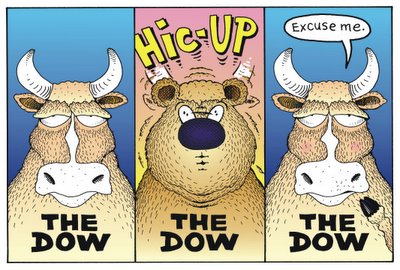Frequently Asked Questions
 Q: What is your investment philosophy?
Q: What is your investment philosophy?A: We like to think, as Warren Buffett does, that a stockholder is essentially someone hoping to participate in a company's evolution and success.
We look for companies we think will reward their consumers/end users as much as they will their investors. In our screening process, we focus on the business model, valuation, and the external environment. Capable management is obviously very important.
Q: You guys make rapid-fire buy and sell recommendations -- how do you go about picking stocks?
A: We implement a top-down approach to investing.
Every company operates within a certain environment, so the first thing we try to do is understand a given company's industry/sector.
Know the climate.
Let's use the beleaguered airline industry as an example.
It's characterized by bloated pension/health care costs and mean unions, cutthroat competition, gargantuan fixed costs, and high energy prices. Those sorts of ills cripple margins, eat into profits, and even bring industries under regulatory scrutiny.
If the milieu is ugly, the stock is probably ugly.
After we digest macrowave data like economic sentiment and industry mood, we dig into the micro-specifics.
Whether we're deciding if a company's debt to equity ratio is too high or we're basement fishing for unjustifiably depressed multiples, we try our best to make sense of a company's numbers.
Financial health, it goes without saying, is of paramount importance. One caveat, however: It doesn't matter if a company is making money hand over fist today -- can the company make money tomorrow (recall that investors pay for future earnings)?
Warren Buffett called it economic moat: how does a firm protect itself and prevent intruders from breaking into the castle? Without a competitive advantage, a firm is vulnerable to better mousetraps, pricing pressure, and a plethora of other differentiators and/or quality advantages.
Even better than a financially sound company is a financially sound company that's underappreciated and yet to land on Main Street's radar. It's what legendary value investor Peter Lynch called "street lag" in his seminal book, One Up On Wall Street.
When an analyst wakes up from his slumber and intiates coverage on your secret, you can surely expect other analysts to follow suit. That's called herd mentality. These sort of stocks we call Seinfeld stocks, named after the hit sitcom comedy.
Seinfeld didn't "break out" until its 6th or 7th season -- however, the show had a loyal, niche following for its first 4 years. Some of the biggest winners in the history of the stock market were Seinfeld stocks -- success stories that chugged along and then flew straight to the moon after the masses got word.
Ideally, you'd like to see these stocks gradually undergo institutional and insider accumulation. When the elephant jumps into the pool, the splash is large -- pensions, banks, mutual funds -- they've got fat wallets, so pay attention to what they're buying.
Insiders know more about a company's condition than anyone else - they look at the books almost daily. While insiders sell stock for many reasons, they buy for just one: they think the stock is going higher.
Lastly, stock charts. Dismissing a chart is like going on a road trip without a map. You may reach your destination safe and sound, but why take the risk? Charts give you a snapshot of a stock price's past price/volume action and can tell you in a matter of seconds whether or not that spike you saw this morning on CNBC is worth fretting about or just a minor blip on the radar.
In the end, we're looking for a good story and/or growth at a reasonable price -- and we'll do whatever it takes to find it, even if it means going to the bathroom with a stock chart in hand or carrying an annual report into the jacuzzi.
Q: On your buy recommendations, what is your track record?
A: We are currently upgrading our infrastructure (servers and maintenance) so that we can better track all the stocks mentioned on this site.
To answer your question, our best picks are up 10-15% inside 6-8 weeks. Please peruse our archives until we make the proper cosmetic adjustments.
Q: What valuation method(s) do you use?
A: We employ a hybrid of comparable multiple and DCF (discounted cash flow) models.
Q: What stocks do you own? Do you have a disclosure policy?
A: If we write about a stock that we hold a position in, we'll tell you.
At the time being, we are overweight in healthcare and consumer staples/goods.
For additional information, we strongly urge you to read our TERMS OF USE.
Q: Exactly how many stocks do you guys follow?
A: We currently have between 1,500 and 2,000 stocks on our radar.
Q: What the heck does "catablast" mean?
A: The market always gave us a sense of eruption, explosion, and surprise. Everyday, we hear of stocks that "tank," "pop," "blow up," and "soar" -- so we chose a name that would simultaneously convey that feeling and be easy to remember.
Got a question? We're all ears -- please send an email to feedback@catablast.com
<< Home